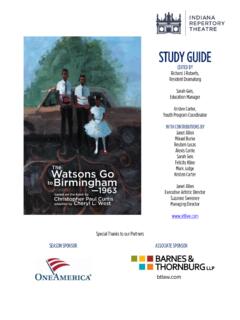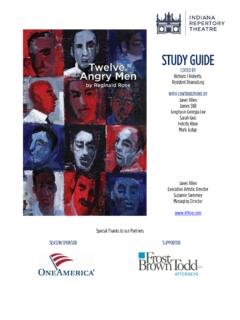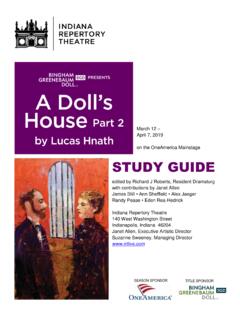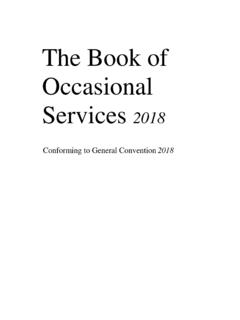Transcription of STUDY GUIDE
1 October 16 November 11, 2018 on the IRT s Upperstage STUDY GUIDE edited by Richard J Roberts, Resident Dramaturg with contributions by Janet Allen Raelle Myrick-Hodges Junghyun Georgia Lee Ari Fulton Justin Hicks Reuben Lucas Randy Pease Eden Rea-Hedrick Indiana Repertory Theatre 140 West Washington Street Indianapolis, Indiana 46204 Janet Allen, Executive Artistic Director Suzanne Sweeney, Managing Director SEASON SPONSOR PRODUCTION PARTNER ASSOCIATE SPONSOR TITLE SPONSOR 2 INDIANA REPERTORY THEATRE PIPELINE BY DOMINIQUE MORRISEAU Nya s son, Omari, is tormented with rage and in trouble at school.
2 A fractured family navigates a broken system as a mother fights for her son s future in a world divided by race, class, and money. Compassion and eloquence galvanize this gritty new work by one of America s most sought-after playwrights. In Pipeline, students will get an eye-opening perspective on the American education system. Through poetic dialogue we see a mother and son fight for a way out of the school-to-incarceration cycle while sharing the total humanity of everyone involved. This Off-Broadway hit tackles numerous issues of prejudice and privilege through the eyes of young people, and the adults trying to protect them. Pipeline will encourage your students to begin a conversation and build understanding of polarizing perspectives.
3 STUDENT MATINEES 10:00 AM on October 23, 24, 25, 30, & 31, & November 1, 2018 ESTIMATED LENGTH Approximately 90 minutes AGE RANGE Recommended for grades 9-12 CONTENT ADVISORY Pipeline is a modern drama that contains strong language throughout and some adult situations. A script preview is available upon request. STUDY GUIDE CONTENTS Synopsis 3 Executive Artistic Director s Note 4 Director s Note 5 Designer Notes 6 We Real Cool 7 COVER ART BY Native Son 8 Invisible Man 9 Playwright Dominique Morisseau 10 KYLE RAGSDALE The School-to-Prison Pipeline 12 Alignment GUIDE 13 Discussion Questions 14 Writing Prompts 15 Activities 16 Resources 17 Glossary 18 The Role of the Audience 21 STUDENT MATINEES, ARTIST IN THE CLASSROOM, & YOUTH AUDITIONS Sarah Geis 317-916-4841 CLASSES, YPIP.
4 & SUMMER CONSERVATORY Randy D. Pease 317-916-4842 INDIANA REPERTORY THEATRE 3 THE STORY OF PIPELINE Nya is a divorced mother and public high school teacher trying her best to raise her teenage son on her own. Her son, Omari, is a bright but very angry young man who struggles to fit in at his expensive private school, Fernbrook Academy. When an altercation with a teacher becomes physical, Omari faces expulsion or worse. He tells his girlfriend, Jasmine, about his plan to run away from school. Meanwhile, Nya discusses the situation with her coworkers at the public high school, fellow teacher Laurie, who has just returned from a three-week leave for reconstructive surgery after being attacked by the family of a student, and security guard Dun, whose friendliness Nya is quick to rebuff.
5 After a stressful day at school, Nya drives to Fernbrook to pick up Omari. She finds him gone and talks to Jasmine instead, urging her to reveal where Omari has gone. Jasmine initially refuses, but at last tells Nya truthfully that she knows Omari has run away, but not where he has gone. That night, however, Omari returns home of his own accord. Nya and Omari try to talk about what happened, but they are unable to find any resolution. Nya tells Omari she needs instructions for how to help him, but he has nothing to offer. The next day, Omari s father, Xavier, comes to talk with Nya about Omari s future. They decide to pull Omari out of Fernbrook and send him to live with Xavier.
6 After another stressful day at school that involves Laurie hitting a student with a broom and facing the loss of her job, Nya breaks down with a panic attack that sends her to the hospital. In the hospital waiting room, Omari and Xavier confront one another over their difficult relationship. Nothing improves, and Xavier walks away, leaving Omari with Nya. In the play s final scene, Nya pleads with the school board not to press charges against Omari, while Omari presents his mother with a list of instructions to improve their relationship. Cole Taylor & Renika Williams in the IRT s production of Pipeline. Photo by Zach Rosing.
7 4 INDIANA REPERTORY THEATRE WRESTLING WITH THE SYSTEM BY JANET ALLEN, EXECUTIVE ARTISTIC DIRECTOR We are delighted to introduce the force that is Dominique Morisseau to our Indiana audiences with this production of Pipeline. A native of Detroit, Ms. Morisseau has enriched our American dramatic literature landscape with a dozen wide-ranging plays that refract the American race experience with a sharp and insightful voice. When I saw Pipeline at Lincoln Center in the summer of 2017, I was literally breathless with the strength of the narrative, the clarion cry of the characters, and above all, the impact of the story itself. Her ability to capture so many pulsing human intersections in a swift 90 minutes without ever getting polemic was so vivid and timely that I couldn t wait to make a production of this play for our Indiana audiences.
8 The way she has created this piece of theatre makes it very hard to turn away, certainly harder than turning off the television or moving to another less disturbing news story on your feed. Her art causes the content content we all share responsibility for to make us wrestle with, and potentially question, our own assumptions about race and education. What Morisseau does in this play is land the audience in the middle of some of America s most important issues about young people, particularly young people of color: how do we educate them, how do we care for them, how do we protect them, how do we prepare them? Even these questions point to one of the problems the play identifies: in trying to create systems that will help children thrive, we reduce them to a population, a cohort, a group to be dealt with, rather than a unique set of individuals, each with his or her own unique challenges.
9 The student in this play, Omari, is entirely himself, not just a construct of his time, his generation, his color, his economic status, his family background. And yet how often do we reduce children to statistics, to data points about graduation rates, test scores, college entrance access? Parents and teachers of all socioeconomic positions and races battle with these concerns daily, trying to do the best they can for their students in a system that seems rigged for failure. These are some of the primal questions Morisseau raises in this breathtaking play. It isn t often that a play comes along with such a superb blend of craft and social content, a blend that impacts and informs us while staying true to itself and its art.
10 And yet the layers of social issues that the play touches and enlightens are extraordinary: not only about education, but about friendship, about love, about economic class, about race, about institutions, about aging, about economic mobility, about family the list could go on and on. What I hope above all is that we can t stop thinking about it and talking about it, that the play penetrates our thinking and our emotional lives as no news story can, and that it helps us see, with greater clarity, how we are each a part of the social fabric that has such negative impact on this unique child. Aim Donna Kelly, & Toussant Jeanlouis in the IRT s production of Pipeline.










